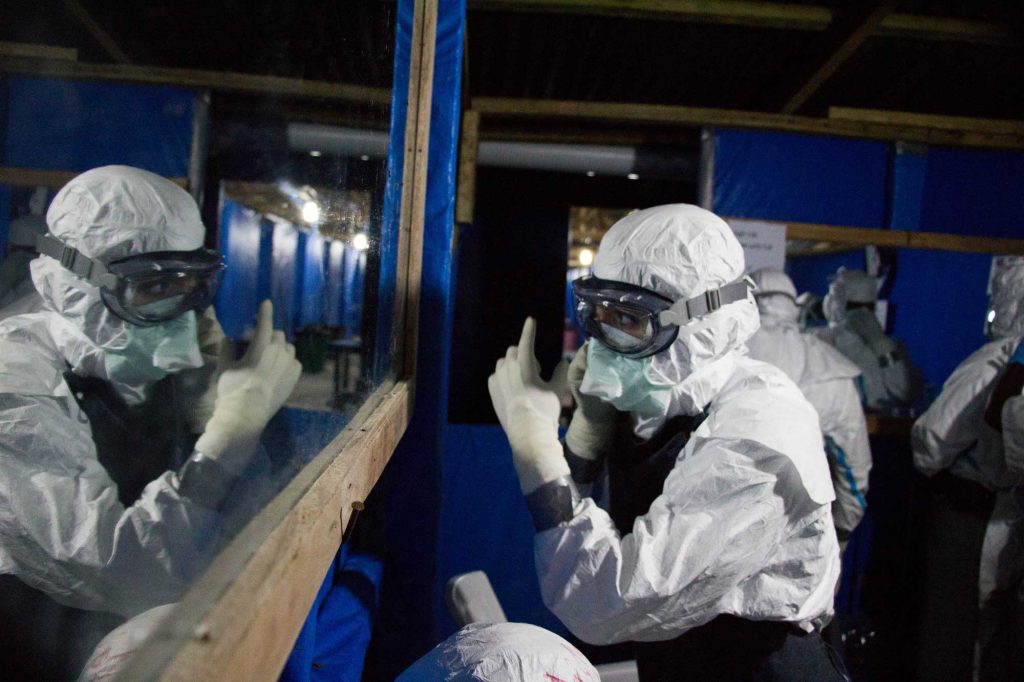Week 1
I have joined the fight against Ebola in West Africa. Each experience with relief work has come with its own unique set of challenges and opportunities for personal and professional growth. Ebola is unlike any of those previous experiences. I hope to describe the reality of this deadly virus in Africa- more importantly tell the stories of those suffering, dying and surviving- without adding to the near fact less hype created by the media.
I have never been afraid of relief work and the places it has taken me, but I found myself hesitant to board my final connecting flight in Brussels as it would take me into the heart of Ebola. It didn’t take long to learn that fear is actually a friend here in West Africa, as it leads to vigilance. That fear, combined with the inability to let your guard down for even a moment, is like carrying a gorilla on your back all day.
After a few days of training, I began covering shifts as a team leader. Yesterday was one such shift. It began- as always- with medication distribution and patient care in the suspected Ebola building (separated from the confirmed Ebola building). A young man named John had been admitted the night before in serious condition. He had survived the night and was still conscious. After bathing him and giving him small amounts of water with a syringe, I walked out to find a blanket for him. When I returned, he looked at me with large, frightened eyes and began to gasp for air. Out of habit, I quickly looked around- expecting to find lifesaving medications, equipment or assistance. My fogged goggles brought me back to reality and I turned back to John. Unable to do anything else, I held his hand and talked to him until the gasping ceased and he left this world. Time was continuing to tick and other patients still needed care, so we covered him up and left for the confirmed building- leaving him for the burial team to collect later.
Of course, not every story is sad. There are many that survive and the moment they find out they beat the virus is an emotional moment for us all. There are also many quietly courageous individuals that deserve to be recognized and to have their story shared. One such individual is George. George is a man in his mid-thirties who contracted the virus over a week ago. He spent many days in the confirmed unit- occasionally knocking on deaths door. A thinner but jubilant George emerged a week later- alive and anxious to get home and take care of his family and his farm. He stayed in the unit a few extra days to give the psychosocial team time to convince his village he was no longer a threat and didn’t need to be permanently kicked out of his home. Eventually, George danced his way- with staff and remaining patients cheering him on- out of the confirmed unit. As he was waiting for his ride home, his five year old son arrived and was checked into the ETU. Without hesitation, George returned to the unit to care for his son rather than return home. Little William is now the best cared for patient in that unit, as his dad is painstakingly attentive to his needs and never leaves his side.
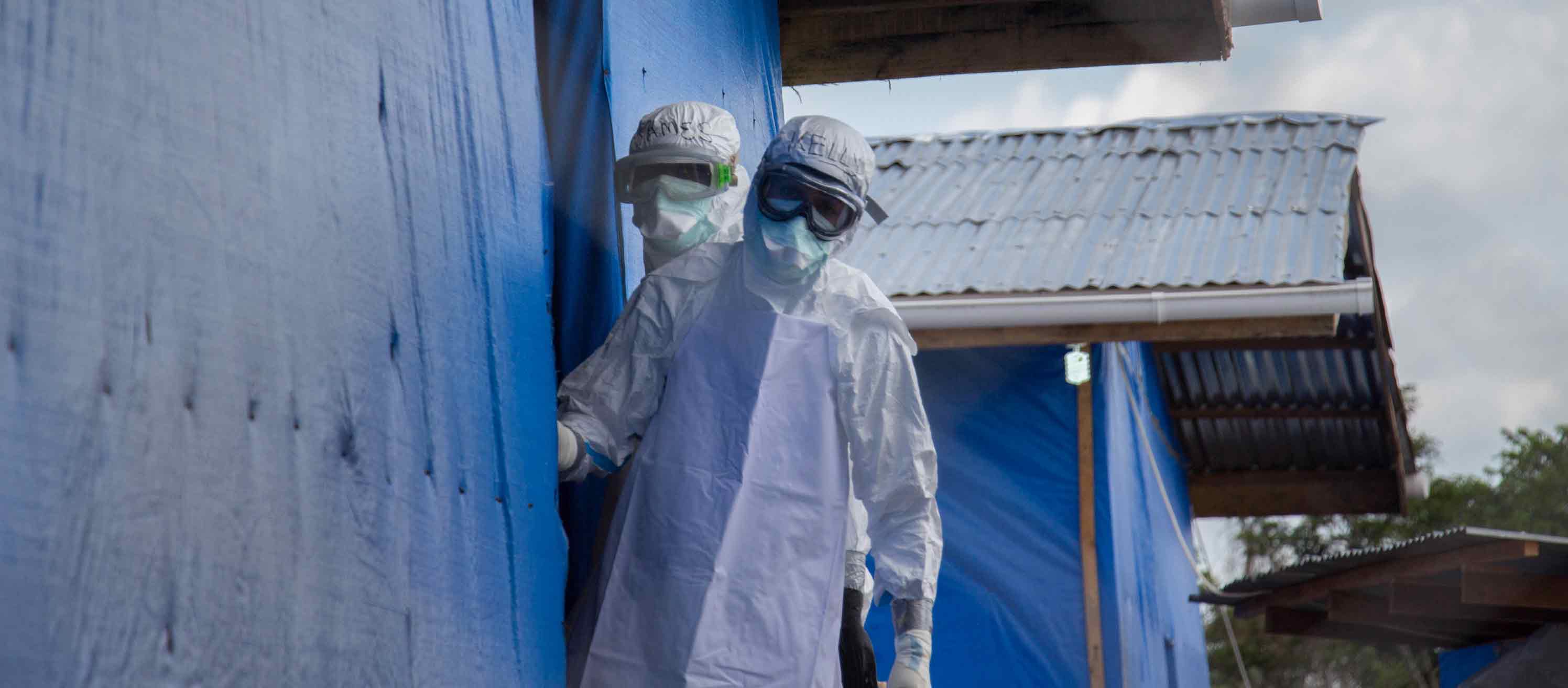
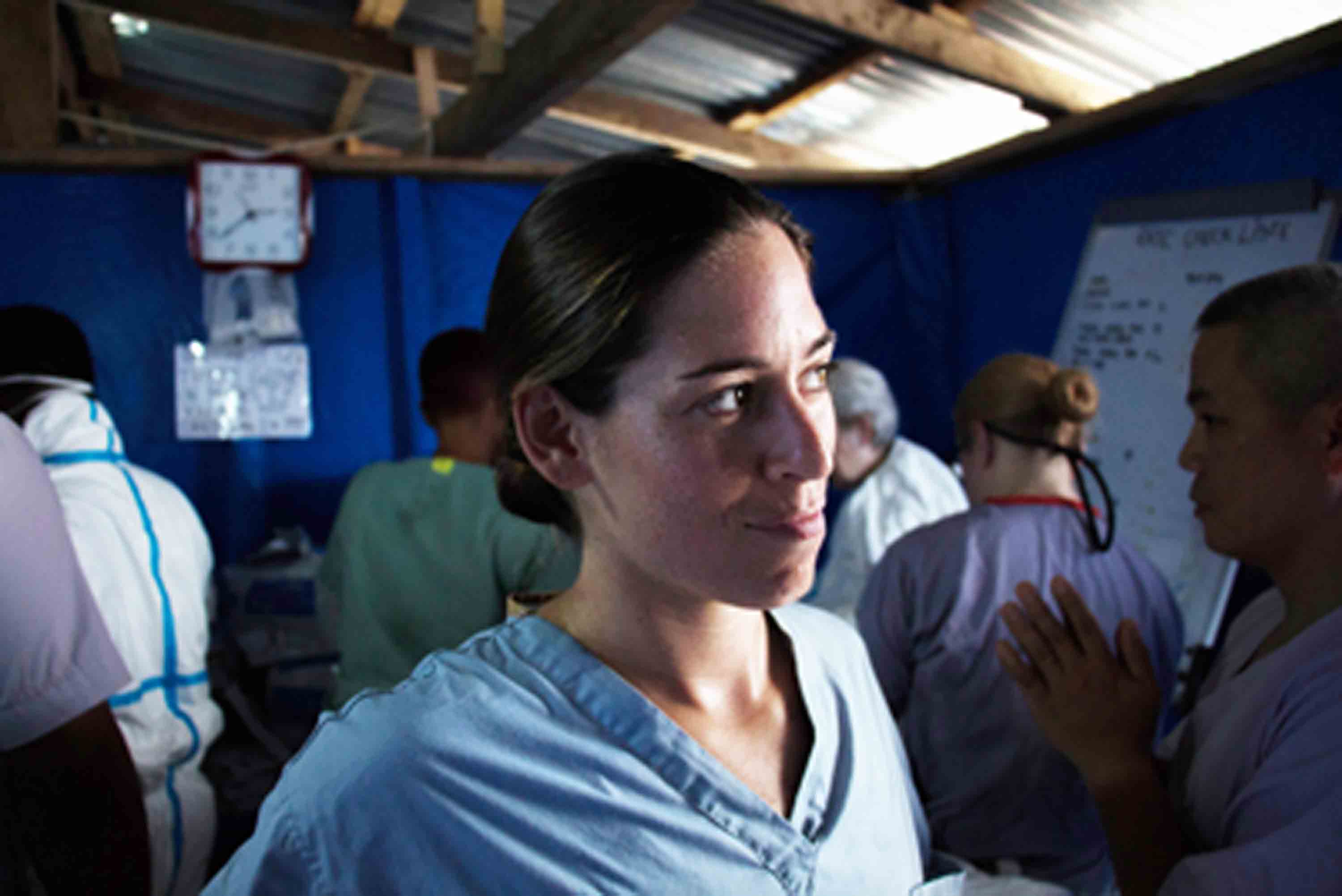
Week 2
Last week, an 11 year old boy named Solomon lost his cousin Rancy to Ebola. Since that time, Solomon has eaten very little and spoken even less. A few days ago, another boy- the same age as Solomon- arrived at the ETC. His name is Joe. While Joe was in the suspect ward of the ETC, he also refused to speak and ate very little- not out of grief and depression like Solomon, but out of fear. We actually found him hiding in a corner of the unit one day- much to my hearts dismay. His blood test came back positive and he was moved to the confirmed ward of the ETC. Once there, Solomon and Joe instantly became friends. Both boys changed dramatically overnight. They began to eat, to drink, to smile and to speak. The encouragement and joy seen on the faces of the medical staff was almost as priceless as the smiles and laughs of Joe and Solomon as they took turns visiting each other’s room and sharing the treats brought by family members.
In fear, this world has nearly forgotten the humanity of those suffering. What are statistics at home, are names, and faces and loved ones here in West Africa. In fear, the world has allowed courage to hide. In fear, the world has nearly criminalized compassion. We cannot let fear be the driving force in our lives. We cannot let fear suffocate the innate goodness that exists within each one of us. By virtue of being human, the suffering of others in this world belongs to us all.
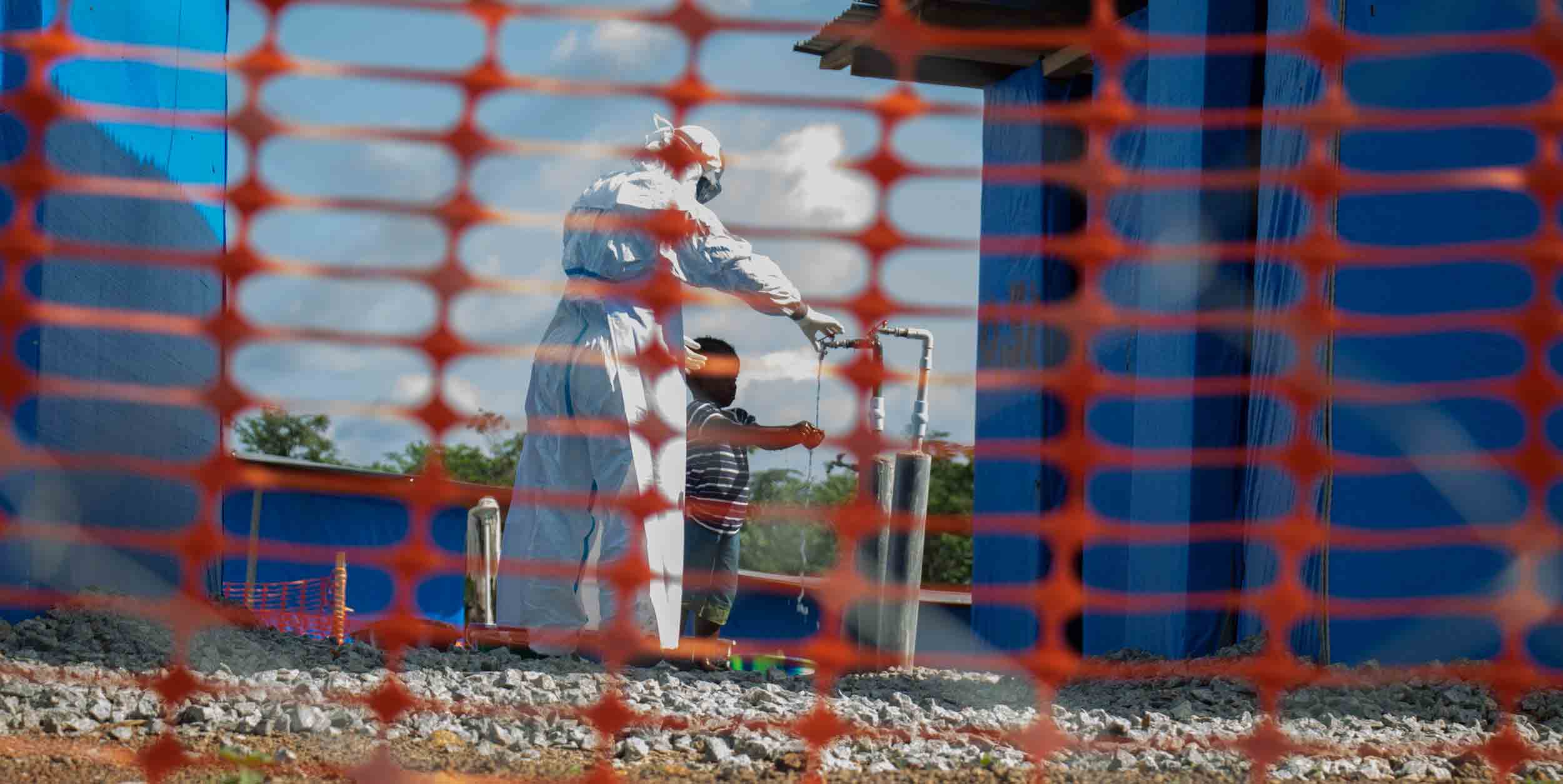
Week 3
With each passing week, these updates seem more difficult to write. Only so much can fill a single letter and so many faces, so many stories, so much hope, and so much sadness fills each day here in Liberia. Providing comfort, compassion and care despite full PPE, limited patient contact and limited resources, can be a daunting task.
Many times, the greatest displays of courage and compassion come from the patients themselves. A few weeks ago, a 17 year old girl named Bendu was admitted to the ETC. As she grew stronger- and without prompting- she began taking care of the many children that are without family on the unit. Everyone refers to her as mama Bendu. Shortly after Bendu was discharged from the unit, a three year old girl named Satta had to be admitted to the unit without family. We contacted Bendu and offered her a job, which she eagerly accepted. Not only does Bendu look after the little ones with great care, I am learning that she spends day and night caring for any person in need on that unit. She told me yesterday that she wants to become a nurse. I am humbled and amazed by the amount of courage, selflessness and compassion that exists within that one little woman.
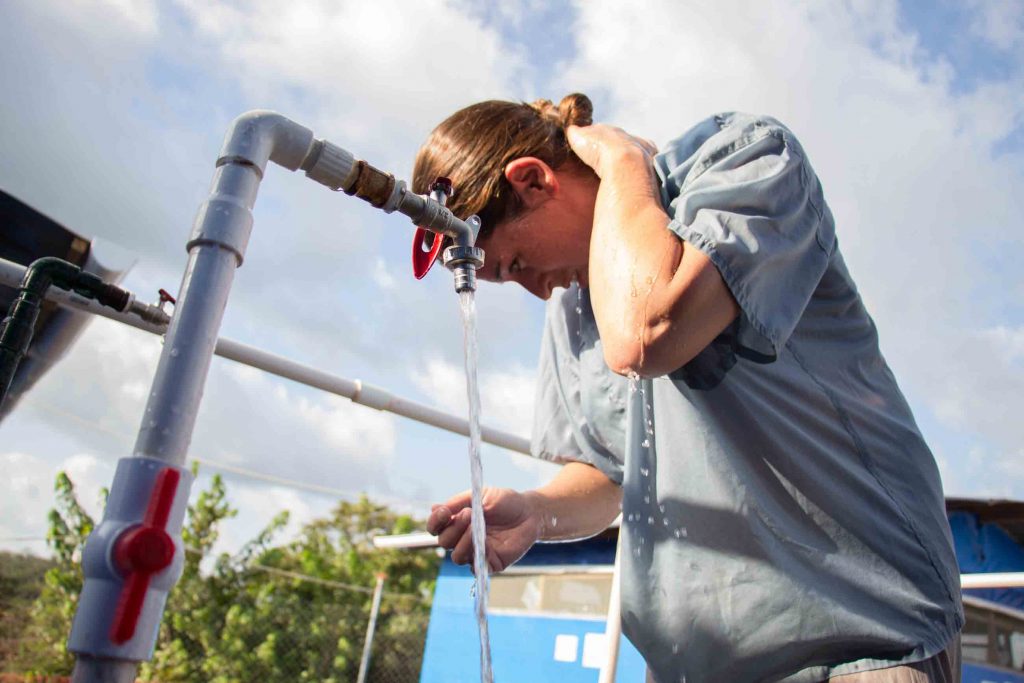
Week 4
Another week has come and gone here in West Africa. As remnants of the rainy season disappear, the heat and humidity seem to be climbing rapidly. Of course, this means there are now more insects, more scorpions, more snakes and more difficult working conditions. Despite those challenges, we are more determined than ever to contain the virus, provide good care and convey to our patients the depth of our commitment.
Wearing full PPE is a challenge for many reasons. In addition to the physical limits, it makes it difficult to recognize individual staff members and masks all of our emotions. Not a day goes by that I don’t wish I could pull that mask off so that my patients know I care- so they can see that I am laughing, smiling or even crying with them. The kids, especially, are terrified and uncomforted by our alien appearance. Christine- the sister of Rancy and cousin of Solomon- was one of those kids.
Christine was one patient that we didn’t expect to survive. There were nights when she was close enough to touch death, but somehow held on. She has finally turned the corner and is a whole new person- sassy, demanding and snooty. She has never been fond of the PPE encumbered medical staff and- even in better health- remains unconvinced. A few days ago, I went into her room to see how she was doing. As I started walking out, she stood up on her bed, started crying and yelling at me not to leave. I went back and sat at the end of her bed and started talking to her. She didn’t respond, but instead, crawled onto my lap and put her arms around my waist. My heart melted all the way down into my boots and stayed there pooling with my electrolytes and fluid volume. I put my arms around her and rocked her for a while. Christine left for home a day later- I found a part of myself wishing that she didn’t have to leave.
Liberia is teaching my heart to stretch and grow. It is stripping me of my normal methods of demonstrating compassion and care due to full PPE and limited patient contact. It is requiring me to participate in some of the most excruciatingly painful situations I have ever seen human beings experience. Just this morning we delivered a 26 week old baby in the confirmed ward- he died twelve hours later. I am learning what it means to love – and how to communicate that love- more deeply and in ways I didn’t even know were possible. I am learning that I have placed too much value on external demonstrations of compassion when what really matters is what is happening internally. A heart that truly loves has no trouble conveying love and compassion- no matter the circumstances- because that type of love and compassion resonates from the very deepest corners of the soul and becomes an almost physically compelling force experienced by all those around.
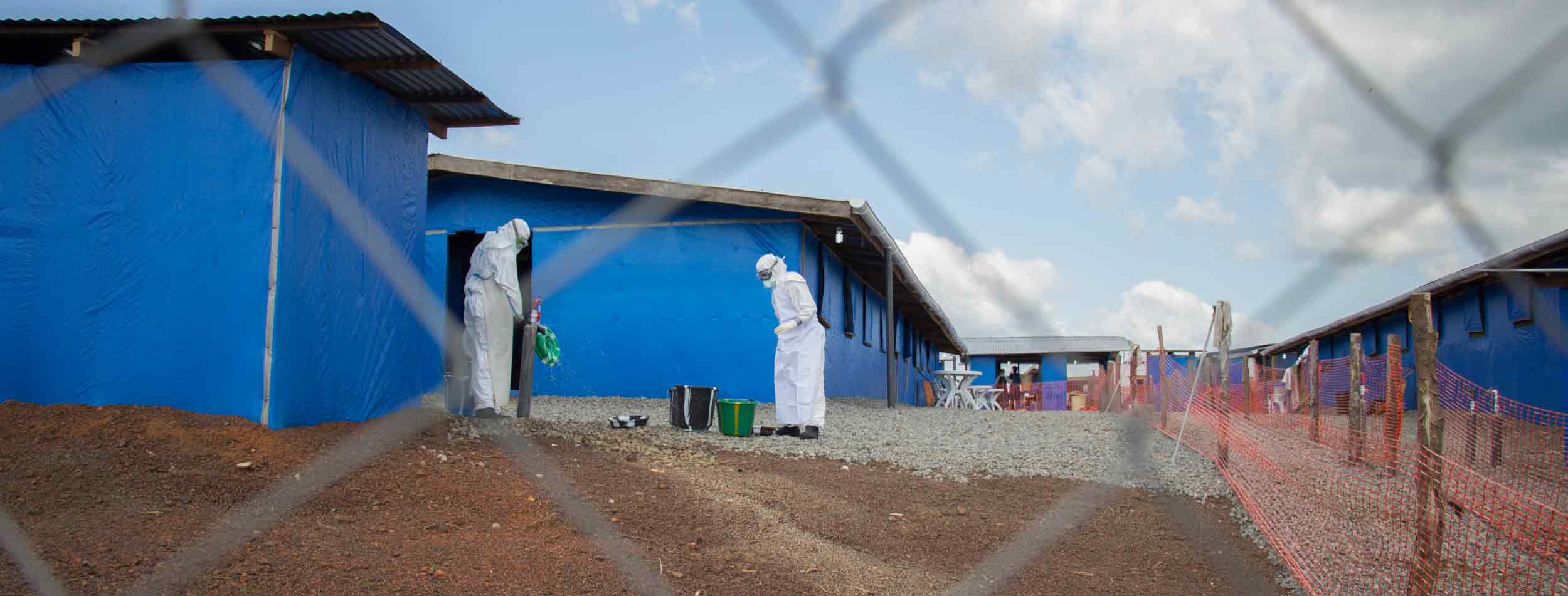
Week 5
While we now have a record low number of patients, we are all holding our breath. Even one case has the potential to spread the virus to another individual and another village. Despite the low census, even the smallest of numbers and the smallest of outbreaks can carry a magnitude of devastation.
We are learning many outlying villages are infected, but are unable to get to the ETU due to location. Only the stronger Ebola patients are able to make the journey to the ETU from these outlying villages- those most critical must be left behind. Recently, we received a patient from one of these areas. His name is Emmanuel. When he walked into the triage room, it was obvious that he had been carrying a very heavy burden. He is young and strong, but his broad shoulders were hunched as if they were attempting- and faltering at- carrying the weight of the world. The story began to pour out immediately. Emmanuel’s wife, Mary, began experiencing Ebola symptoms three weeks ago. Two week later, Emmanuel’s seven month old daughter, Felicia, also became ill. Despite Emmanuel’s attentive care, Felicia passed away.
A day after her funeral, Emmanuel began experiencing the same symptoms as his wife and daughter. Knowing that he couldn’t take care of his wife if he was sick, Emmanuel left and made the journey to the ETU. The following day, Emmanuel’s blood test came back positive for Ebola. Upon hearing this news, Emmanuel began to cry and asked, “Will I ever be able to go home again”? A few days after he moved over to the confirmed unit, we received word from Emmanuel’s village- Mary had also passed away. Emmanuel spends most of his time sleeping or sitting with his head bowed and resting in his hands. He has lost nearly everything- not even his home is a guarantee anymore, as many villages are refusing to let survivors return to their homes. I can’t even begin to fathom the extent of this man’s suffering.
For the past seven weeks, the ETU has also been a training site for newly arrived staff. These staff members are from many different organizations and will be working in new Ebola treatment units across Liberia. On the first day of training, they are taken on an in depth tour of the ETU- which includes a short hike into the forest to the burial site. With each passing week, there are more grave markers and with each trip into the forest, the scene is a little more sobering. While it is heartbreaking and overwhelming to see how many have died at our ETU alone, I am also overcome with a sense of gratitude. So many beautiful souls now sleep in peace in that serene niche of forest. I am so grateful to have been part their lives- their joys, their suffering, their triumphs and their sorrows. It has been a painful but wonderful gift to accompany each of them on this part of their journey in life- they have taught me so much and I will forever be a better person because of them.
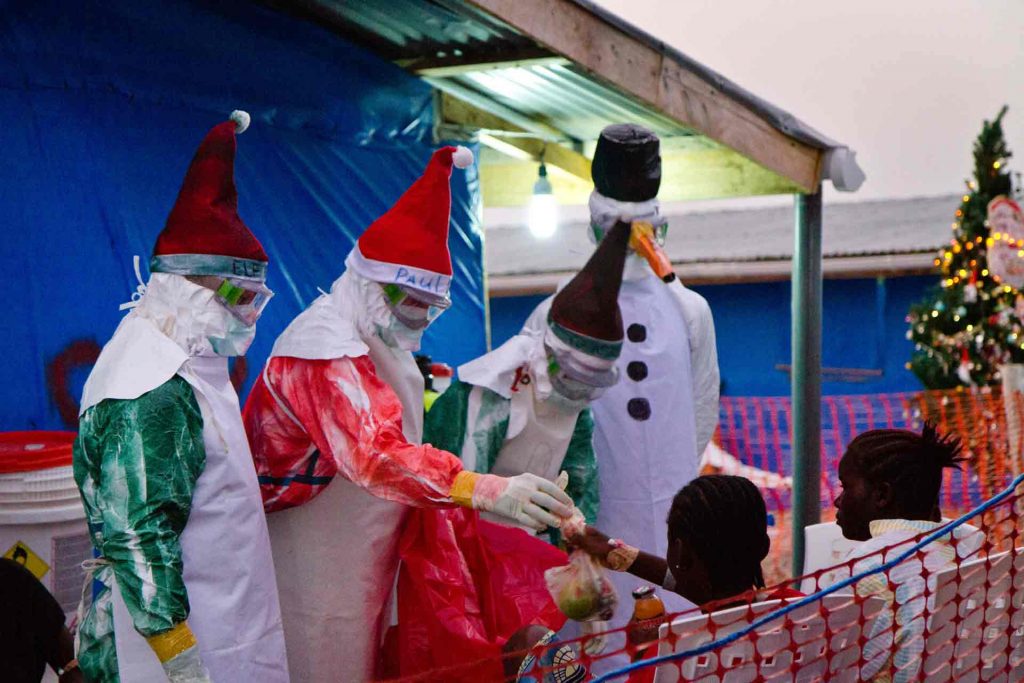
Week 6
A woman named Rachel was admitted to the suspect unit. She is 32 weeks pregnant and has a two year old child at home. Rachel’s blood test came back positive for Ebola. As Rachel entered the confirmed building for the first time, she nearly collapsed in anguish. She refused to go any further into the unit, so we lowered her to the ground. She remained there, crying. A few minutes later, Korto, another patient, came out and walked right up to her. Korto gently spoke to Rachel- encouraging her and sharing her own experience as a mother in an Ebola unit. After a few minutes, Rachel stopped crying, stood up and walked arm and arm with Korto into the confirmed unit.
Rachel must deliver inside of an ETU. Majority of woman miscarry shortly after contracting Ebola. Rachel is far enough along that there is hope her baby will survive a premature delivery- provided the baby doesn’t already have Ebola. Recently, there has been much less fetal movement and Rachel is keenly aware of the danger her little one is in. As a result, Rachel has been quiet and reserved. A few days ago, she became especially withdrawn. After speaking with her, we discovered that there was much more weighing on her heart than the thought of losing her unborn child. Rachel found out a few days ago that the woman taking care of her two year son died of Ebola. Her two year old has been living in the village without care- going from house to house crying and begging for food. We are now working with the village chief and child protection agencies to locate him and find placement until Rachel can return home.
I am sure that everyone is busy with last minute Christmas shopping, planning, and decorating. We just finished putting up Christmas trees in each one of our units. Though it has helped create some sense of Christmas, it’s a little strange to come face to face with a Christmas tree inside of an Ebola Treatment Unit in the middle of a tropical Liberian forest and while sweating profusely in full PPE. Those trees are constant reminder of the families and traditions we are missing, but they are also a constant reminder of the reason we are here in Africa. We have all come out of a desire to bring comfort and hope to those that have watched helplessly as their family and friends suffer. We have come to care for those that have been evicted from their homes and left to die on the streets. Much of the world has forgotten the humanity of those behind the face of Ebola, we have come to return that humanity- we have come to return their dignity. Remaining at their side and continuing this fight is- by far- the best Christmas gift we have to offer the people of West Africa.
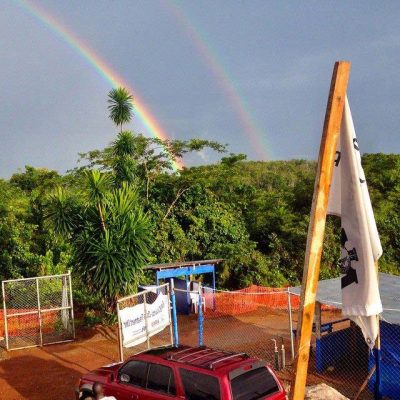
Week 7
Following the current sporadic pattern of Ebola in Liberia, we had yet another bush village experience an outbreak. Among the group that came to the ETU was a 47 year old grandmother, named Neyamah, and her two three-year-old grandsons. Though the boys are not brothers, they have been raised by their grandmother and as siblings. The first grandson tested negative and was sent home. The second three-year-old, Samuel, tested positive and was moved to the confirmed unit. Shortly afterwards, Neyamah also tested positive and was moved to the confirmed unit. They were placed in the same room, though even the same room was not enough proximity for Samuel. Every afternoon and night, Neyamah would lay next to Samuel until he fell asleep. Once he was sleeping, Neyamah would go back to her own bed to rest. Within minutes, Samuel would be awake and scurrying across the room to climb back into bed with her. Once Samuel was asleep again, Neyamah would quietly get up and move to the other bed. The process would continue until Neyamah gave in- which she always did- then the two would sleep peacefully the rest of the afternoon or night.
As time progressed, both Samuel and Neyamah became too ill to be in the same bed or moving back and forth. Eventually, Samuel was moved to another room so that one of the survivors could help take care of him. Samuel was the first of the two to pass away. He died at night, but Neyamah wasn’t informed of his passing right away due to her own critical state. The morning following Samuel’s death, Neyamah was told the awful truth. When she heard the news, she began crying out and then collapsed. She died a few minutes later. That afternoon, a solemn procession of staff and family accompanied the burial team to the graveyard where Samuel and Neyamah were buried side by side.
As my time here in West Africa winds down, I find myself looking back on the many patients I have cared for and the many people I have worked with over the past four months. One theme seems to consistently come to mind- what it means to be a hero. True heroes seem hard to find in our modern culture. They seem to be few and far between- with many only acquiring such a title by means of popularity or economic status. If there was only one lesson I could take from this experience, it would be that a hero is simply an ordinary person who chooses to live their life in an extraordinary way. These heroes open their hearts, embrace courage, give generously, and risk much- never anticipating a reward, recognition or even a pat on the back. These heroes are not few and far between- they are all around us, walking unnoticed among us. They show their faces at the most unexpected times and in the most unexpected places- especially during difficult times, like the Ebola epidemic in West Africa.
I am humbled, honored and awestruck by the many heroes I have met here in Africa. From the chlorine sprayer who risks his life every day at an Ebola treatment unit so that, “when my children grow, they will see that their father did his part to help and they will have an example to follow”, to the taxi driver who knowingly risks his life to bring an Ebola patient to the unit when everyone else choses to leave that person laying on the side of the road. From the nurse who used all of the vacation time she had saved to go on her first vacation in years in order to come join the fight against Ebola, to the physician whose children bravely stood up for the work their father was doing in West Africa when other students began to harass them at school. The list could go on almost forever. There is so much good in this world. It’s not a good created and encouraged by the rich, the famous, or the popular- it’s a goodness born of the small, everyday heroic acts of ordinary people.
